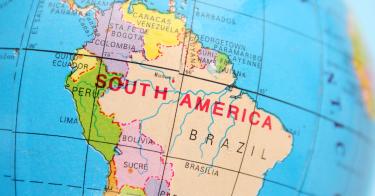When other nations debate their place in the global struggle between China and America influence, they often cite a proverb from the Kikuyu people in Kenya: “When elephants fight, it is the grass that suffers.” The implication is that small and medium size nations at risk of being squeezed in great power competition should remain neutral or hedge.
But nations are not grass, and while avoiding the elephants might have been good advice on the African veld, it makes no sense in contemporary geopolitics. To look out for the peace, prosperity, freedom, and security of their people, small states around the world must stop avoiding tough choices. To look after their own interests, they must wield the power and influence they do have.
Nowhere is this clearer than in the Atlantic community.
From the high north to Antarctica, the Atlantic encompasses approximately 46 million square miles and 80 littoral nations and territories, including 29 Latin America countries and 23 African countries.
>>> U.S. Must Act Quickly to Preserve National Security Interests, Block Spread of China’s Influence
Since World War II and the Battle of Atlantic, this space has not been contested on a major scale, but that might be changing soon.
China today is aggressively expanding its influence in the Atlantic. Soon, Beijing could dominate the region with impunity, shattering almost a century of freedom and prosperity. Of course, such an outcome would also invite Russia and Iran to conduct malicious actions in this space. That means countries with a stake in the Atlantic can no longer hedge their bets; China, Russia, and Iran are interested in subservient clients not collaborative partners.
Unfortunately, Latin America’s corrupt regimes are asleep at the wheel, or worse: Brazil, Colombia, Peru, El Salvador, Argentina, Honduras, and Mexico are all actively seeking closer ties to Beijing, while the most autocratic regimes in the region, Cuba, Venezuela, Nicaragua, and Bolivia, have begun establishing a Chinese military presence. Meanwhile, Russia has significant sway in Niger, Central African Republic, Mali, and Zimbabwe and is constantly seeking closer ties with South Africa.
Worse still, these countries are working together in organizations like the São Paulo Forum, a coalition of radical leftists that began meeting in the 1990s. Today, its members include some of the most odious leaders in Latin America. And their goal, as Olavo Carvalho put it, is rebuilding “the Communist movement… to reconquer in Latin America all that we lost in East Europe.”
To address this unprecedented challenge will require unprecedented joint action in the Atlantic world. Which is to say, America needs a new Atlantic strategy. To be successful, however, this strategy must be more than simply a project dictated from Washington. Indeed, leadership is needed from many places; it doesn’t merely have to come from Washington. It is also needed from many levels, especially sub-national actors.
Across the Atlantic world, there are overlapping spheres of influence in political circles, business communities, and civil society that share common goal of promoting human flourishing and safeguarding peoples and institutions against malign influences. And given how many governments in the region are already moving toward China, engaging with these sub-national actors is even more critical in any American campaign for the common good.
One place to start could be local governance. Latin America is home to three megacities—São Paolo, Mexico City, and Buenos Aires—that all have important ties to the Atlantic and could be open to cooperation with Washington, or even American states and cities. America could also expend more resources on local elections—like those set to take place in Colombia this October, which are arguably just as important as the presidential elections set to occur in 2026 in determining the political future of the country. Moreover, considering how much influence they have over public works projects—which are often targeted by the Chinese—it is especially important for the United States to engage with the city councils and mayors of small and mid-sized cities, too.
>>> The Rise of Republican National Security Prioritizers
All this to say, a new Atlantic Strategy won’t be successful unless we listen to the concerns and elevate the voices of sub-national actors at the local level.
Of course, there are significant obstacles to working with allies in civic society and local government across the Atlantic world. Even in the few places where civil society and private business does flourish and hasn’t been hollowed out by corruption, honest actors are often suppressed.
Brazil, for example, has been taking notes from Russia, China, and Iran in crushing internal dissent. Earlier this year, under the guise of combating “misinformation” and “fake news,” the government and Supreme Court have eliminated dissident journalists access to social media, and now the National Congress is considering a Fake News Law that would allow the government to impose significant fines or prison for sharing political commentary or satire online.
But that shouldn’t dissuade us. The mission of promoting and protecting the freedoms and liberties of the Atlantic world is too important. By encouraging, empowering, and engaging with a vibrant community of thought leaders across the community we can combat China’s increasingly pervasive influence. The only alternative is letting malicious forces continue to relentlessly press, bribe, and influence more governments to abandon their nation’s interests, sacrificing the Atlantic community to the growing shadow of power of Marxists and thugs. And that’s not good for anybody.
This piece originally appeared in RealClear Defense





